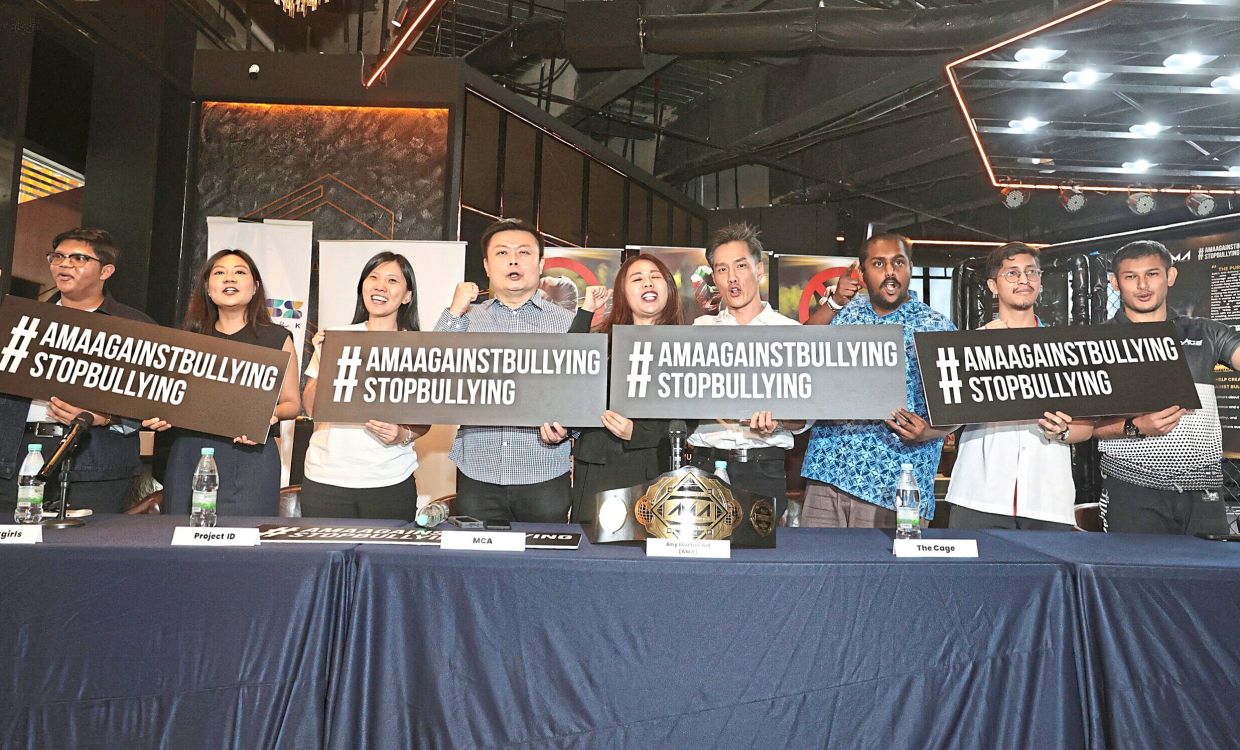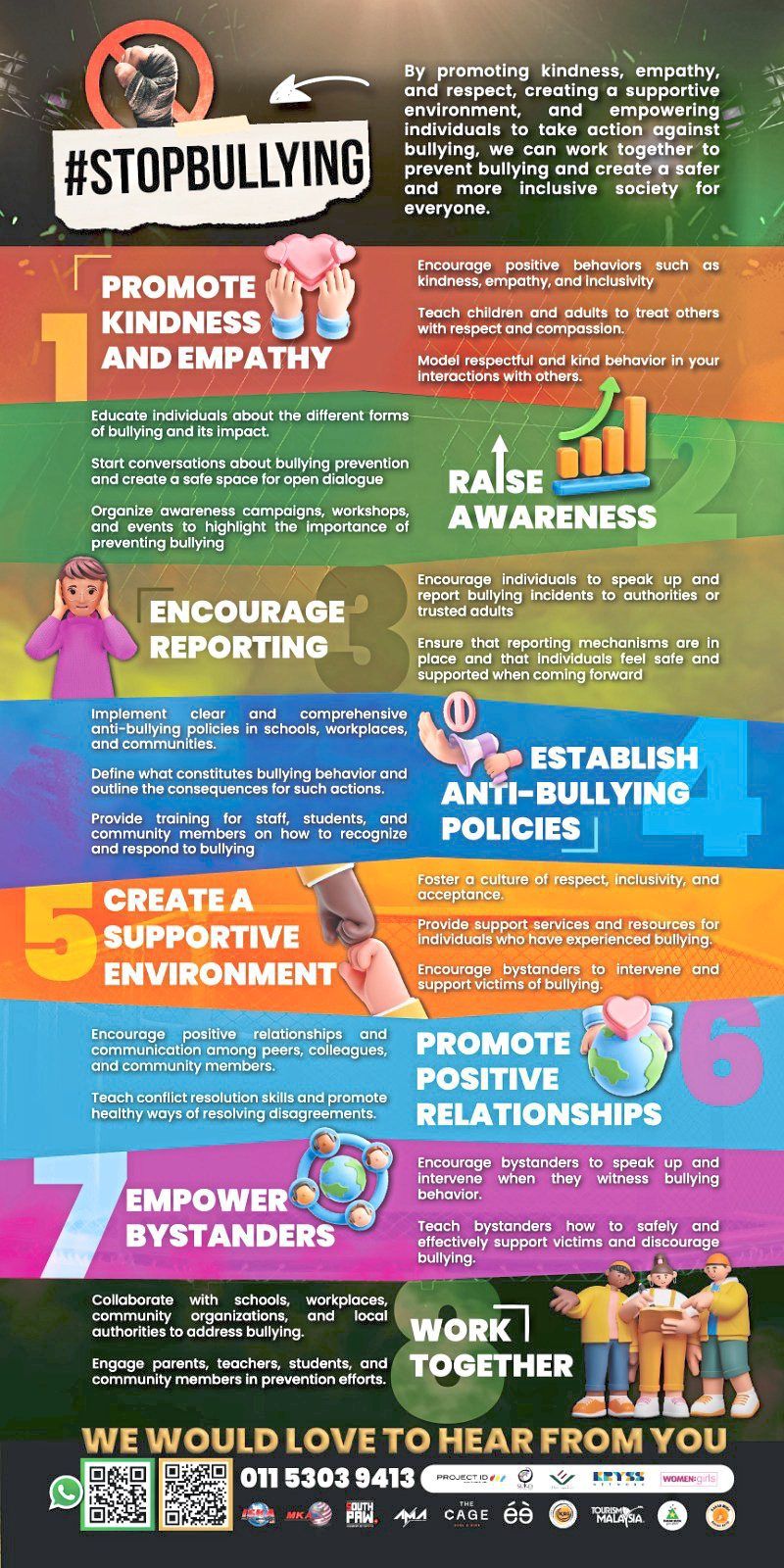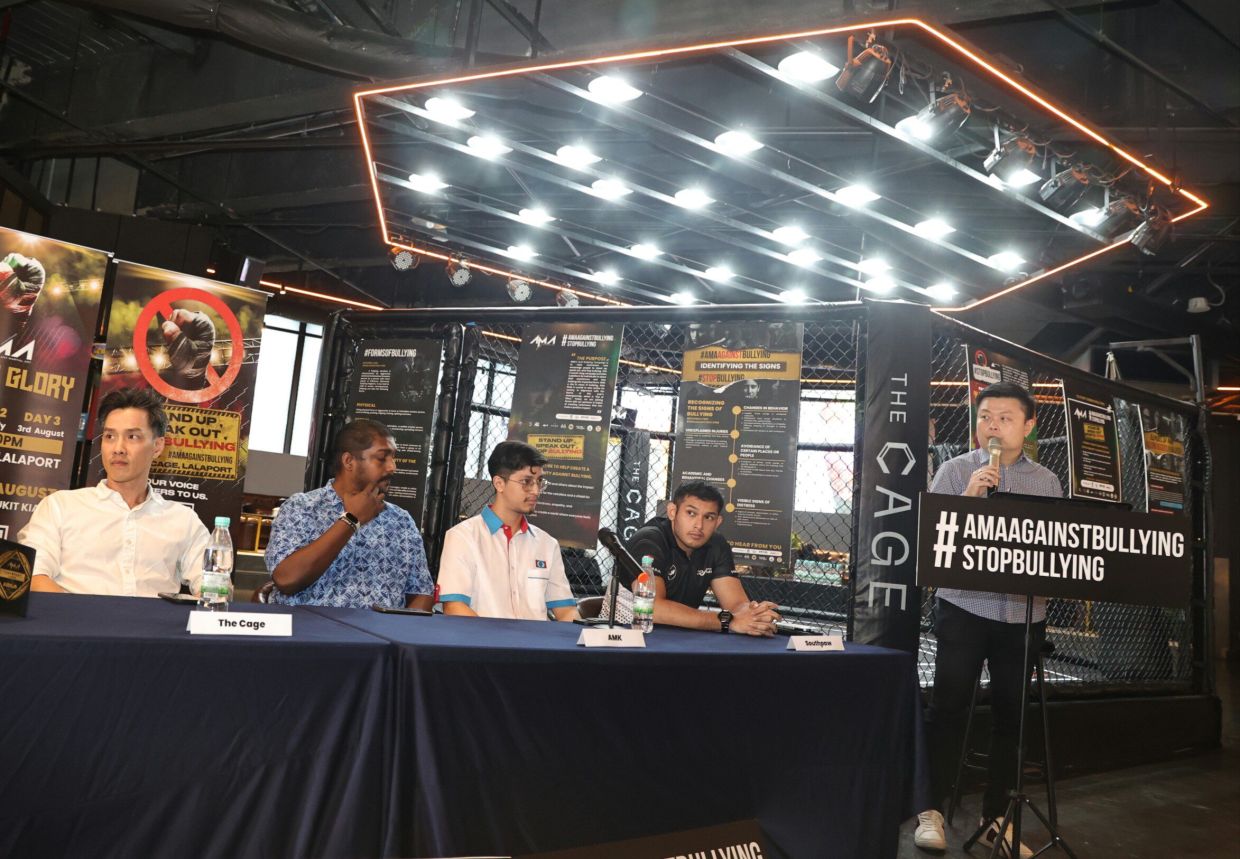At the launch of AMA's Anti Bullying Campaign are (from left) Abdullah, Izza, Tsoo, Chong, Chua, Hong, Tembok co-founder Chandra Arjun, Huseyin, and Southpaw founder Dan Chee.
Bullying has reached an alarming rate in recent years, with many cases of physical violence, cyberbullying, and emotional harassment being reported across Malaysia. The consequences of bullying are severe and far-reaching, often leading to anxiety, depression and even suicide among the youth.
It's with this in mind that Any Martial Arts (AMA) has organised an anti-bullying campaign to raise awareness about the detrimental effects of bullying, while promoting empathy and kindness, says AMA Championship organising chairperson Jess Chua.
Chua was speaking at the launch of the anti-bullying campaign in Kuala Lumpur recently. The campaign will run until National Day on Aug 31.
The campaign has eight goals: To promote kindness and empathy; raise awareness; encourage reporting; establish anti-bullying policies; create a supportive environment; promote positive relationships; empower bystanders; and encourage collaboration.
To viral the efforts online, the hashtags #stopbullying and #amaagainstbullying are used.
The mechanics of the campaign are straightforward: The public are encouraged to take on four pledges to help create a safer community against bullying: To educate myself and others about the impact of bullying; to be a voice for the voiceless and a shield for the vulnerable; to spread kindness, empathy, and understanding; and to strive to create a world where everyone feels safe and accepted.
Even though it is just a month-long campaign, we hope that the message that is sent will be far-reaching with more efforts to help curb bullying. And we aim to run this campaign yearly, Chua says.
Since the MCO, bullying cases have increased in Malaysia. Based on a Ministry of Health report (Institute for Public Health's National Health and Morbidity Survey: Adolescent Health Survey 2022), one in five adolescents in Malaysia has bullied or harassed someone online via Internet, cell phone, or other electronic devices.
The study, which involved 33,523 secondary school students aged 13 to 17, highlighted that the most prevalent forms of cyberbullying were making rude comments online (11.3%) and spreading rumours about someone online (6.9%). Additionally, it revealed that a small percentage of adolescents have participated in other cyberbullying activities, such as sharing or posting embarrassing photos of others (4.8%), making threatening comments to harm someone online (2%), soliciting discussions about sex online (1.8%) and urging others to engage in sexual activities online (1%).
The report also touched on general bullying experiences among adolescents. About 8.6% of the respondents reported being bullied, with higher rates among Form One students and young adolescents. The most common forms of bullying included mocking someone's appearance (26.7%), making sexual jokes or comments (16%), intentionally excluding individuals from activities or ignoring them (13%), ridiculing someone's race, nationality or colour (11.7%), and other forms of bullying (20.2%).
Regarding violence among adolescents, the report indicated that 14.8% had experienced physical attacks, with males being more frequently affected at 16.1%. Additionally, 16% of the respondents had been involved in physical fights, with a higher incidence among males at 18.9%.
However, bullying goes beyond adolescents and teens. Young adults nowadays too have experienced cyberbullying whether at institutions of higher learning, workplaces, online, or outside.
For the anti-bullying campaign, AMA has collaborated with several NGOs who are prominent figures within the human rights community in Malaysia.
MCA National Youth Deputy Chairman Michael Chong declared a "war against bullying” during his speech at the launch.
“We stand ready to fight hand-in-hand with our counterparts against bullying,” says Chong.
“The government has recently announced that they will enhance the Social Media Act where social media platforms that have more than eight million users will need to register and have a licence to operate in Malaysia. But we believe this is not enough. Even if all social media platforms are registered and licensed, without proper enforcement, and a law to take action against the culprits, it won't end bullying in Malaysia,” says Chong.
He cites as example what happened to social media influencer Esha who committed suicide as a result of cyberbullying, and one of the bullies got away with just a RM100 fine.
“This is why we urge the government to not only hold the social media platforms accountable, but to also take action against the perpetrators. We need heavier penalties against bullying, especially cyberbullying. Besides a fine, jail sentences can be implemented,” he says.
Angkatan Muda Keadilan Federal Territories Youth Assembly Member Huseyin Kilicman shares his own personal account of being bullied.
“When I was in primary school, I was different from the other kids, so I got picked on.”
“It's not easy to come forward and share personal accounts of being bullied, but I think this is very necessary to raise awareness and stand against bullying.”
“Bullying happens in every strata of society. It happens emotionally, physically, verbally, as well as online ie cyberbullying. It also happens at different stages in life, whether in primary or secondary school, or university. And, it also happens to working adults.”
“It is a social problem that needs to be tackled through enforcement of the law, but it also needs to start from the people within the society,” he says.
“It's everyone's responsibility: If you see your friends being bullied, what should you do? When someone tells you that they are being bullied, how can you help them? As a bystander, the first action we need to take is to support them. This helps them rise up against the bullying and learn to stand up for themselves,” he adds.
Hong Lua, founder of The Cage where the launch was held, agrees that curbing bullying “starts at home”.
Hong shares his personal experience.
“I was around six years old and started hanging out with some kids at school. While playing, they picked on this girl who looks different because she's of mixed parentage.
“They were really mean and picked on her just because she's different, and I joined in without realising it was bullying at that time, until the girl broke down and started crying. Then I realised, 'Hey this is wrong, it's not right', and I stopped hanging out with those kids,” he shares.
“If families don't educate their kids, this kind of bullying is going to happen, often without the parents' knowledge,” he highlights.
“So it takes all parties – families/parents, neighbourhoods, and the entire community – to be involved, when it comes to preventing bullying.”
Project ID manager and registered/licenced counsellor Tsoo Kah Yen says that having a safe space for students, in the school environment, to learn and grow is crucial.
Promoting a positive school environment and culture is important. It's not just the teachers but also students who need to be involved. Pembimbing Rakan Sebaya (Peer Mentors) is a programme we've implemented to empower students to become leaders in advocating for the well-being of others in their schools. In cases of bullying, they are the first line of support for victims, she says.
“But it's not just about helping the victims, it's a “three-fold issue” because bullies and bystanders also need help, she adds.
“It's about helping bullies curb their tendencies towards aggression and violence – like what is it they've experienced in their lives that causes them to become bullies. And it's about helping bystanders to know what to do and how to handle the situation when they witness bullying,” she explains.
Women: girls executive director Izza Izelan calls upon all to “come together to solve the problem, to fight against bullying”.
“One of the pledges of the campaign – is to be a voice for the voiceless and a shield for the vulnerable – and to all who are bystanders and witnesses, I call on you to be a voice for the voiceless,” says Izza.
“Often, we don't know how we can help save a victim from being bullied or a worse fate.”
She highlights a case of bullying in an institution.
“A boy who witnessed another boy being bullied, informed the warden anonymously in writing. This eventually helped as evidence for the case.
“He was brave enough to alert the authorities – although not brave enough to reveal himself – about what he witnessed,” she says.
“You may think you don't hold a position of authority in the organisation but you're still a somebody to the person being bullied and you're still in a position to help them,” she adds.
Kryss Network advocacy and outreach officer Abdullah Nishad highlights the importance of “fostering a culture of empathy and kindness within schools”.
“Creating a bully free environment requires the collective effort of students, teachers, parents, and the community. This will mean a cultural shift in changing attitudes and acceptance of bullying as a norm. It can no longer be accepted as culture or part and parcel of growing up,” says Abdullah.
Workshops, seminars and open discussions should be regular fixtures within our ecosystem for students to discuss issues of bullying, violations of privacy among among one another, as well as to report these cases to those they trust, he says.
We also need to establish robust support systems, confidential reporting mechanisms, counselling services and peer support groups that can provide students with safe spaces to share their experiences and seek help, he adds.
All teachers and staff should receive training on how to handle bullying sensitively and effectively.
And we must empower students to become allies, encouraging them to speak up against injustice, by standing up for their friends and stopping bullying when they see it, he concludes.
> Members of the public can share their own stories of bullying via the campaign hotline (+6011-53039413) to help in the advocacy towards a safer and more inclusive environment.















